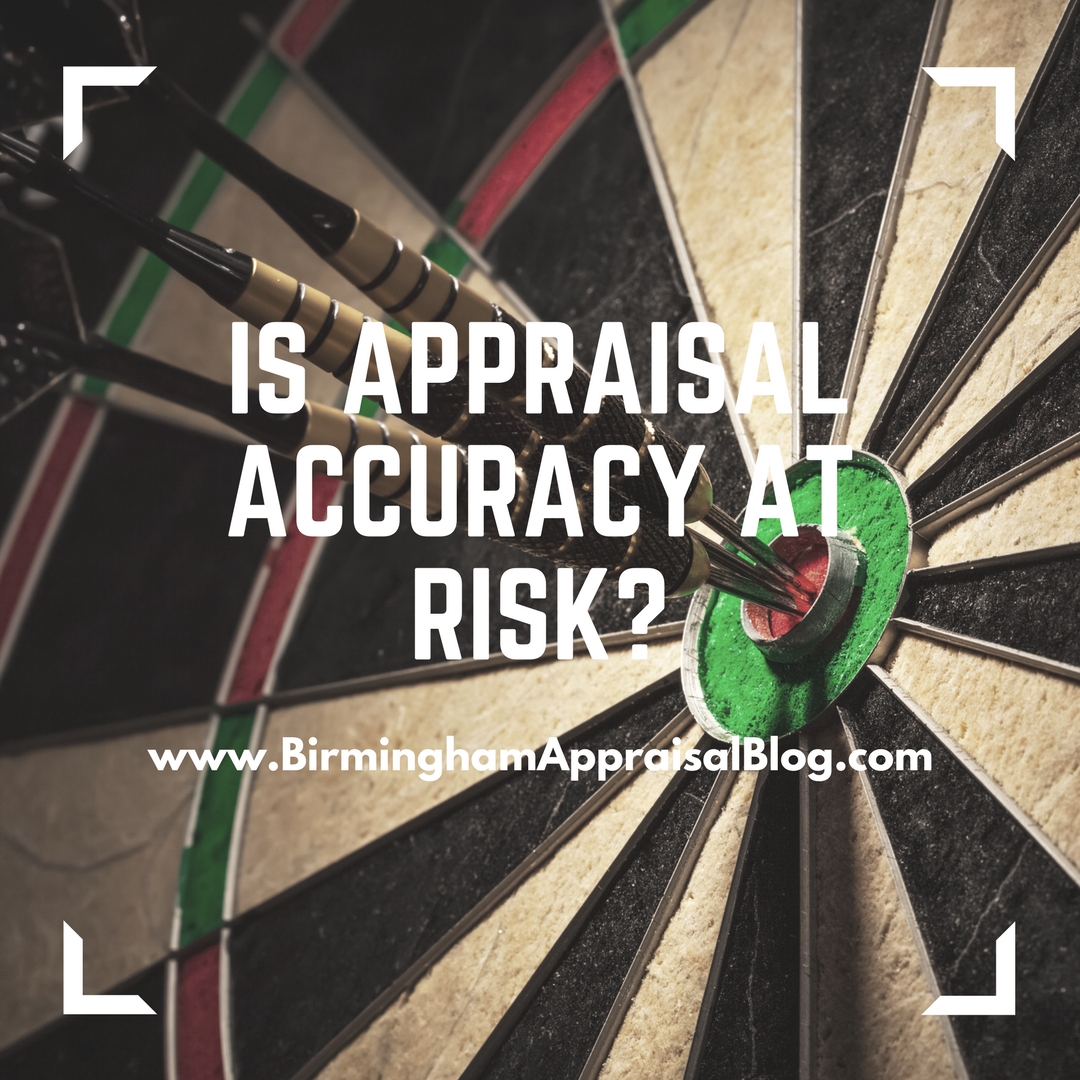Are We Trading Appraisal Accuracy For A Cheap Report?
 Banks will do anything to get around the cost of an appraisal. After all, they don’t make enough money the way it is, right? In case you haven’t been keeping up with the mortgage and banking world there have been some interesting things happening that could jeopardize appraisal accuracy, so grab a cup of coffee and let’s chat.
Banks will do anything to get around the cost of an appraisal. After all, they don’t make enough money the way it is, right? In case you haven’t been keeping up with the mortgage and banking world there have been some interesting things happening that could jeopardize appraisal accuracy, so grab a cup of coffee and let’s chat.
A Little Bit of Background
There has been a false narrative being spread around the country that there is a shortage of appraisers in our industry and this is resulting in longer turn times and higher fees. It’s been documented elsewhere that while the total number of appraisers has declined there is still enough practicing appraisers to meet the demands in the majority of areas. There are some locations that have limited appraisers and this has increased fees and turn times but they are the exception and not the rule.
What those spreading these rumors will not tell you is that since legislation went into effect that spurred the creation and growth of Appraisal Mangement Companies (AMC’s) the fees being paid to appraisers has steadily declined. This was due to the flawed AMC model of paying appraisers by giving them the leftovers from the fee paid by the bank.
I have seen numerous postings on social media forums that show the appraiser getting less than the AMC for their management of the process. It is because of situations like this that most appraisers refuse to work for AMC’s. This has resulted in AMC’s spreading the rumors about a shortage so that they can circumvent the traditional appraisal process and hire their own army of appraisers to serve there own needs.
Finding a Better Way or Circumventing The Process?
So now you know the background of a little of what has been happening. This series of events has brought us to where we are now. Keep in mind that the appraisal process was started to get the professional opinion of an unbiased third party about the market value of real estate and which would provide stability to the real estate market and financial system of our country.
Some of the current talk going around now has to do with finding ways to get around the appraisal process or finding ways to lower the cost of an appraisal to the bank. In my mind, each of these ideas serves to decrease the accuracy and reliability of the appraisal which has the potential to undermine the banking and financial institutions of our country.
Three of the main topics currently being discussed include Property Inspection Waivers (PIW), Hybrid Appraisals, and Appraisal Waivers.
Property Inspection Waivers- I wrote about the PIW in a past post to help inform homeowners about what this would mean for them. You can read that article if you want to find out more. In a PIW situation a traditional appraisal is not performed but rather a value is estimated based on an Automated Valuation Model (AVM) developed by Fannie Mae and their Collateral Underwriter (CU) program.
The Fannie Mae AVM is similar to the Zillow Zestimate because both rely on algorithms to estimate the value of your home. There are certain things that these algorithms will not do that a living breathing appraiser will do when inspecting your property and estimating its value.
There are margins of error when these AVM’s estimate your home’s value and I am sure Fannie Mae has factored in that they could be off in their values. My complaint with this type of appraisal is that if they are wrong with the value and you pay too much for your home you may lose money when you go to sell. This does not matter to Fannie Mae because they have absolved themselves from any future litigation that may result from providing misleading value estimates.
A property inspection waiver may result in an inaccurate value estimate of your home because the “appraisal” they provide will never provide the level of detail that a live appraiser can and it cannot study the particular nuances of the local market. In addition to an inaccurate value estimate of the subject property, there is also the threat of this property providing an inflated value that could wrongly influence future sales in the neighborhood.
Hybrid Appraisals- A hybrid appraisal is where the various duties of the appraisal process are divided up among different parties. The valuation is performed by a certified appraiser and is similar to a desktop appraisal. The property observation may be done by someone other than the appraiser. This could be a real estate agent or some other type of property inspector.
different parties. The valuation is performed by a certified appraiser and is similar to a desktop appraisal. The property observation may be done by someone other than the appraiser. This could be a real estate agent or some other type of property inspector.
The problem with this type of appraisal is that if the property observation is performed by someone who does not know what to look for then the appraisal may not reflect the true value of the property.
If the person performing the observation overlooks something significant about the property that affects its value then the value estimate may be overstated. Knowing what to look for is a key component of the appraisal process and the results of the observation will carry through to the final opinion of value.
Appraisal waivers in rural areas- An appraisal waiver doesn’t just waive the property inspection but the entire appraisal by an unbiased third party appraiser. The request started in a rural area of Tennessee when bank officials claimed that they could not find a certified general appraiser due to a shortage of appraisers. The bank requested waivers for all commercial appraisals performed in the general region and which would also include waivers on residential properties.
The bank in question stated that instead of using an independent appraiser they would use a senior banking officer who had taken all the necessary classes but did was not able to work with a licensed appraiser to get the required experience hours. This is troubling for several reasons, including the fact that the appraisal is not being done by an independent third party and the appraiser is not even fully trained.
If this type of waiver is approved it could set a precedent for other areas and it might spread to all types of appraisals. Allowing untrained and potentially biased people to provide appraisal services can result in possibly inaccurate appraisals which can undermine the public trust.
Buyer Beware
It’s important for consumers to know that not all appraisals and appraisers are equal. When the bank tells you that they will be getting an appraisal on your property, it may not be by an unbiased third party and it may not be as accurate as it could be.
Question
So there you have it. Three of the current appraisal trends could be affecting the accuracy of your appraisal. Before giving permission to the bank to allow them to perform one of these types of appraisal you should know the consequences. As always thanks for reading.
If you liked this post subscribe by email (or RSS feed). Thanks for visiting.
Yes I was blessed! Insurance provider would not give me the figures, told me to consult with a contractor for an estimate. An appraisal would not help completely, because replacement costs can go up or down based on supplies and labor. AND property values go up and down based on comparable sales in the current market. So you can”t base replacement cost entirely on an appraisal.
I agree you, Matilda and the points you make are well taken.
In Oregon, we did have a shortage of appraisers in 2016, but supply and demand quickly corrected and appraisers from other parts of the country moved in and others who had left the business came back. Now that supply and demand are corrected and demand for future appraisers will be less due to technology, the experience requirements to become an appraiser have been cut in half. I see very low cost and poor appraisals on the horizon.
Not a good forecast, Gary. Why does the appraisal profession seem to be in so much turmoil lately?
What could go wrong? That’s my big question when we start to mess with a system of checks and balances.
I agree, Ryan. Lots of things can go wrong but I think people may not be looking at it in the same way we do. I think appraisers have the ability to look at things in an unbiased way since that is part of our job. The checks and balances you mention were put in place for a reason.
We Ron $900 to $1,000 per appraisal in Rural Northern AZ with a 30+ Day from order to site inspect. I’ve seen $1600 appraisals and the worst was $2600. These are residential properties…………
Wow! Those are some high fees, Terry. I cannot see that as being sustainable. I would think more appraisers would enter the market to try to get a share and then of course fees would probably drop as well as turn times.